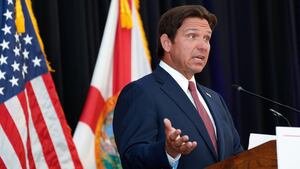Florida voters turned out at the ballot box to reject nearly half of the school board candidates endorsed by Gov. Ron DeSantis earlier this summer in a bid to expand right-wing influence over the state’s education system.
Of the 23 DeSantis-backed candidates, though, at least 11 appeared to have lost their primary races as of late Tuesday night, according to the Associated Press. Another six progressed to runoffs in November after no one candidate scored more than 50 percent of the vote. Only six were declared winners of their races.
The dire results marked a notable shift in the political wind from 2022, when all but five of his 30 handpicked candidates won their races.
At a news conference in Sarasota on Wednesday, the governor acknowledged that it had been an “uphill battle” to ultimately lose most of this year’s races, according to the Florida Phoenix.
“We were helpful as much as we could be, probably more so two years ago, but all these candidates work really hard. And it’s important, especially when you have an uphill battle, you gotta do it,” he said.
The governor added later in the conference that he and his allies “weren’t in position necessarily” to pour as many resources into supporting his candidates as in 2022 “because we’ve got so much other stuff going on.”
DeSantis’ focus in recent weeks has been pulled by his fight to keep two constitutional amendments—one legalizing recreational marijuana and the other enshrining the right to an abortion in the state constitution—off the ballot in November.
“I don’t think it’s good to do,” he said last month. “I don’t think we need to mess up the state.”
At his Wednesday press conference, DeSantis elaborated on his philosophy of losing with the aid of a sports metaphor.
“And you’re usually not going to win those the first time out, but what I found, just as a former baseball player, you know, you don’t swing, you’re not going to hit a home run,” he said, the Phoenix reported. “So, you gotta swing and you gotta be in the game.”
(DeSantis was indeed a star on the varsity baseball team at Yale, finishing up his career with 156 hits and a batting average of .313. The Bulldogs fared poorly as a whole during his time with them, however, racking up an Ivy League record of just 27-53 and bottoming out in his junior season at a dismal 3-17, according to reporting by The Daily Pennsylvanian.)
The Democratic Party of Florida endorsed 11 candidates this cycle, of whom seven won their races and two moved on to runoffs.
The party’s chair, Nikki Fried, celebrated the success of their efforts, saying members had “supported school board candidates across the state to fight back against Ron’s Moms for Liberty candidates and their partisan extremism.
“... Our freedom starts in our schools,” she continued, “and we’re proud to have supported candidates who will fight for our students’ rights to see themselves represented in a book, to feel safe at school, and ensure every student has access to a high-quality education where they can learn and grow.”
DeSantis mocked this attitude at his Wednesday conference, pointing out that it was hardly a big deal that Democrats had successfully managed to hold down school board seats in left-leaning districts.
“You’re now in a situation where someone’s celebrating on the Dem side that they held an area—a school board—in a blue district? Usually that would just be a fait accompli,” DeSantis said.
While DeSantis was ranked one of the most unpopular governors in the country in an April poll, state voters are more ambivalent about him, and he remains immensely popular among both Florida and national Republicans.
That nationwide approval did not translate to a winning presidential run, however, with the governor’s once-ascendant presidential campaign sputtering to a halt in January. Once goosed by millions in donations and a legislative track record cementing him as a party standard-bearer on issues like abortion, gender identity, and the death penalty, DeSantis gradually ran out of steam, losing the all-important Iowa primary by 30 points.
Since then, some experts are seeing signs that median voters might be starting to see the governor as less of a political force to be reckoned with. Or as Matt Nelsen, a political scientist at the University of Miami, put it to the AP, “I think perhaps what we’re seeing is the critical race theory fever is breaking.”







